Twilight Sleep: Discussion Post
Certainly, no amount of "mental deep-breathing" and all the other exercises in serenity; could combat the nervous apprehension produced by this breathless New York life.
On first read, I was a bit disappointed in Twilight Sleep. I felt the novel lacked the punch of The Custom of the Country or the charm of The House of Mirth. I honestly found the novel somewhat hollow. I struggled to figure out how to discuss such a (seemingly) lackluster book and turned to JSTOR for help. I managed to find a few articles and papers to help shape my discussion. What I thought would be a quick post summarizing the novel, my experience, and my overall disappointment with the novel turned into something else.
The first article I read was "Wharton the 'Renovator': Twilight Sleep as Gothic Satire" by Janet Beer and Avril Horner. Their breakdown of the novel and their arguments for its connections with Gothic literature left me second-guessing my understanding of what I read. I decided to sit down and reread the novel with my notebook next to me. When I locked into the text on this second read, the story came alive. There's a subtlety to Twilight Sleep that's easy to overlook. I'm so glad I took the time to dig deeper and see how Wharton pushes the story toward its semi-tragic end. She's a master of foreshadowing, and it's wonderful to look back and see all the little easter eggs I missed on my first pass.
At first, I thought I would struggle to find something interesting for our discussion, but now I'm struggling to streamline all my thoughts into an easily digestible post. As always, I will begin with a summary of the plot. (Note: There will be spoilers, so please stop reading here if you haven't read Twilight or if you prefer not to have the story spoiled.) Then, we'll break down some of the things Wharton satirizes in this novel, including her commentary on productivity, spirituality, and the new woman. We'll also explore some interesting theories about Lita's background before concluding with some final thoughts.
That's more than enough preamble; let's jump into the plot summary.
Summary:
Twilight Sleep is structured like a three-act play. We meet the characters and set up some tension. Then we watch as our characters attempt to resolve the issues that are causing this tension. Finally, everything comes crashing down, changing the lives of our characters forever.
Meet the Manford-Wyant family. Twice-married Pauline fills every minute of her day with meetings, self-improvement, beauty treatments—anything to avoid having a moment to herself for self-reflection. Her first husband, Arthur, lives alone with his cousin—whom he cheated on Pauline with—in his now shabby, outdated old New York home. Pauline maintains a friendly relationship with Arthur, as do their son and her daughter with her second husband, Dexter. Dexter was Pauline's divorce attorney; the two married and had one daughter, Nona. Dexter is a bit of a workaholic, and he and Pauline are often too busy to see each other before dinner at the end of a long day (if they even manage that).
Pauline has two children. She had her son Jim with her first husband. Jim is kind, a bit of a pushover, but caring. He married a stylish flapper named Lita, and they had a baby (referred to only as the baby throughout the novel). Lita has an insatiable zest for modern life, Hollywood, and freedom. Meanwhile, her sister-in-law, Nona, desperately tries to balance enjoying the fun parts of modern life with her need to watch over her family.
There are a few tertiary characters involved, including Pauline's secretary, Maisie, the loyal Mandford butler, Powder, and Stanley, Nona's disappointing love interest. It's a tightly knit cast of characters, but we quickly learn how little they truly know or understand each other.
In book one, Wharton sets her scene. We meet this modern, blended family that seems to have it all, yet each member of the family is running from something. The catalyst that will trigger the family's potential downfall is the young, beautiful Lita. It's clear from the start that Lita doesn't fit in with the Manford-Wyants, and it's uncertain how she and Jim ended up married, given their many differences. Wharton hints that Dexter has an interest in Lita that goes beyond the familial. Lita loves her baby, but she's far from maternal, preferring nightclubs in Harlem over the nursery. She openly declares her desire to divorce Jim and try her luck in Hollywood. This announcement is what sets the plot of Twilight Sleep into motion.
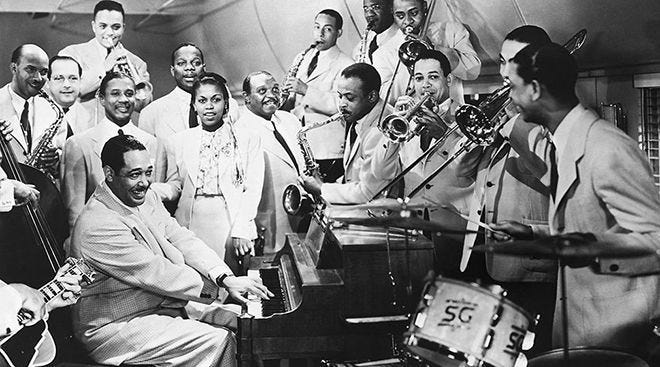
In book two, the Manfords are preparing to spend Easter at their country home, which used to be Arthur's, along the Hudson. Dexter and Pauline are determined to stop Jim and Lita from divorcing, each for their own reasons. Both Pauline and Dexter visit Lita's adopted mother, Mrs. Landish, and we see a glimpse of the bohemian lifestyle Lita was raised in. Lita's in-laws try to persuade Mrs. Landish to help convince her to stay with Jim, but Mrs. Landish believes Lita will make a wonderful movie star and has no intention of interfering. Pauline and Dexter convince themselves that if they take Lita to the country and send Jim down south for some R&R, Lita will relax, forget Hollywood, and the two will stay together.
Meanwhile, Nona catches her father and Lita at a Harlem nightclub while she's out on the town with her married lover, Stanley. She dismisses what she sees as just her father watching over Lita, protecting her from the likes of Tommy Ardwin and Klawhammer. Stanley seems to be more aware of what's happening, but doesn't say anything.
Book two ends with a meeting between Nona and Stanley's dowdy wife, Aggie, where we learn that Stanley has run off to Europe with a married woman. Aggie will only grant him a divorce if he agrees to marry Nona and not this other, less deserving woman. However, Nona refuses to marry Stanley now that he has run away with someone else.1 Can you blame her?
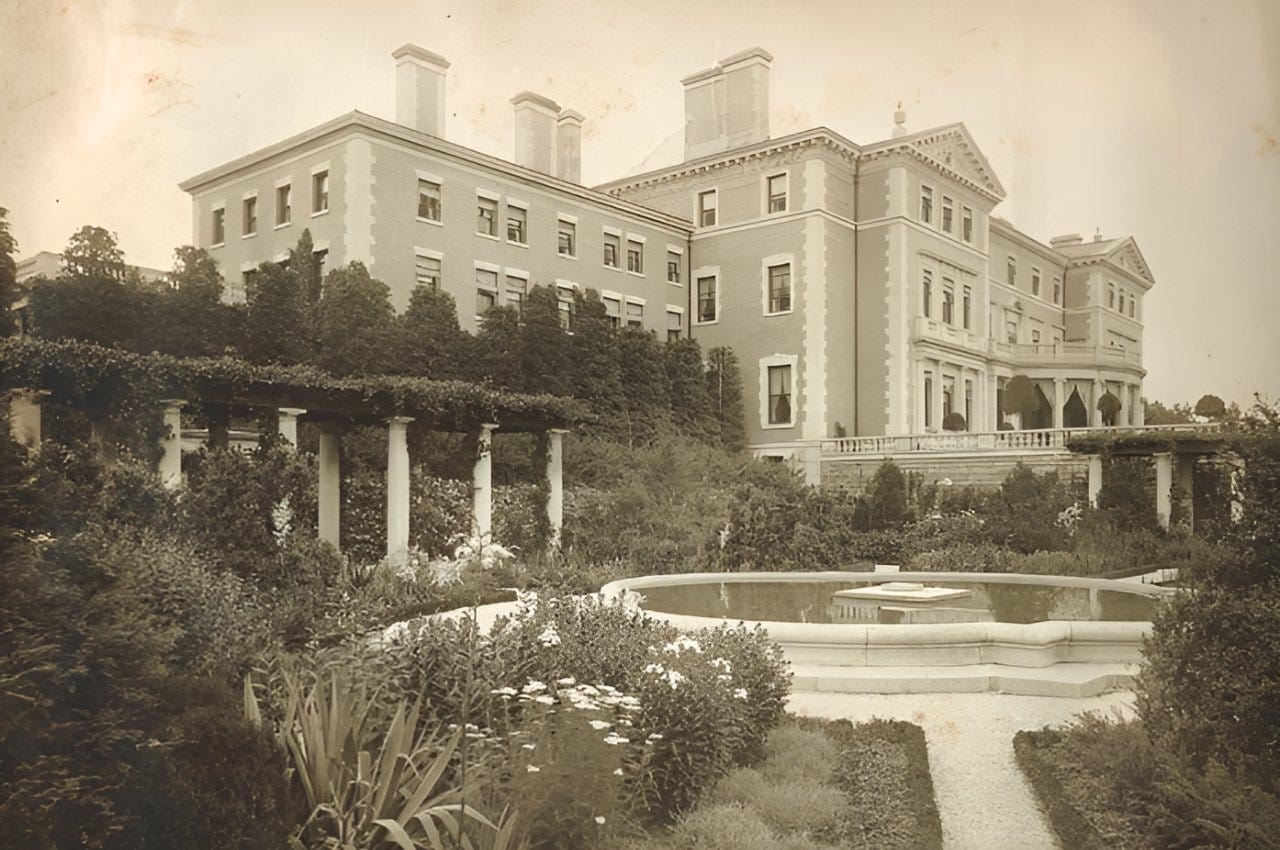
Book three takes us to Cedarledge. Lita remains adamant that she will divorce Jim, but Pauline and Dexter appear to be ignoring her. Dexter convinces himself that he's not interested in Lita; he's really just her protector (sure...). And Pauline is wrapped up in running her large country home and all the modernization projects around the property. She chooses not to see Dexter's affair with the neighbor, Mrs. Toy, or his growing interest in his daughter-in-law. In fact, she convinces herself that Dexter's happy mood is due to all of Pauline's efforts to make Cedarledge a luxurious modern getaway, complete with a heated pool.2
Lita appears to be mellowing out in the country, so much so that both Pauline and Dexter foolishly believe their plan is working. However, Lita is just being a good sport. She's still determined to leave Jim as soon as she returns to the city. One night, Lita steals the car, and when Dexter finds her, we learn how jealous she is of his affair with Mrs. Toy, and they begin an affair in earnest. They spend all their time together, staying out late and living it up as much as any bright young thing can in the country. While Pauline continues to turn a blind eye, Nona seems to be the only family member aware that something is amiss, but she can't stop what has been set in motion.
Both Nona and Pauline are called back into the city for the day, leaving our lovers alone at Cedarledge. Wharton leaves it up to the reader to imagine what Dexter and Lita might be doing while the ladies of the house are otherwise engaged. Nona visits her mother's secretary, Maisie, whose mother is undergoing surgery to treat her cancer. Pauline considers visiting but ultimately decides not to, which is probably for the best. Maisie would likely be freaked out if Pauline suddenly started acting so out of character. Instead, Pauline visits a new spiritual guru.
While in the city, Nona runs into Arthur, who failed to join his son Jim in Georgia. When Arthur meets with Nona, it's clear he's worked up over what's happening with Jim and Lita. He wants Jim to "man up" and take action regarding his wife. He's determined to defend his son's honor even if he won't do it himself. He’s desperate to speak with Pauline about his concerns, but she’s ignoring him.
Pauline and Nona return to Cedarledge, and Arthur follows shortly after. He's nervous, agitated, and needs to talk to Pauline about Lita. They all have dinner together before Arthur leaves to head back to the city. Later that night, Pauline wakes up to the sound of a loud bang, which she realizes is a gunshot. She calls the local fire station before going to investigate. She expects to find burglars, but instead finds her husband trying to keep her out of Lita's room. When she finally gains entry, she finds Nona bleeding on the floor with Lita draped over her, and Arthur cowering in the corner with a gun.3 Powder, the butler, enters and quickly begins to cover up what's happened. He fabricates a cover story that saves the family from scandal.
The novel ends with Nona recovering from her wounds in the hospital while her family prepares for extended trips across Europe. Jim and Lita stay together, and Lita seems to have given up on Hollywood for now. Pauline and Dexter each visit their daughter to say goodbye before she leaves the country. Pauline remains mostly unchanged, while Dexter is remorseful. Unfortunately, neither parent seems to mind leaving Nona behind to rebuild the life they shattered. When her mother expresses a wish for her to get married, Nona clearly states that, based on her experiences, she wants nothing to do with marriage.
Discussion:
Twilight Sleep is a wild satirical ride through the pitfalls of modern New York life. Despite my initial impressions, there's much to dig into in this novel. We will examine a few of the key themes and takeaways from Twilight Sleep. But there’s no way I can cover everything. If there's something I've missed or you'd like to add, please share your thoughts in the comments.
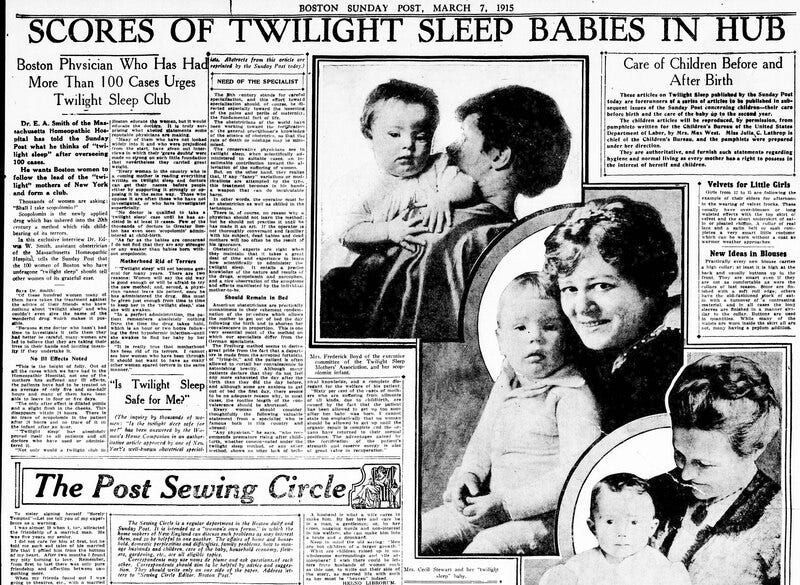
Numbing, Spiritualism, and Midlife Crises in the wake of WWI:
Wharton’s use of “twilight sleep” as the title of this novel is very fitting. Superficially, it references a method of pain management during childbirth that involves giving a combination of morphine and scopolamine to induce pain relief and amnesia. It was quite popular in New York City in the early 20th century. Pauline Manford ensured that Lita had this new, painless way of giving birth when she delivered her baby.
“All she [Lita] asked was that nothing should "hurt" her: she had the blind dread of physical pain common also to most of the young women of her set. But all that was so easily managed nowadays: Mrs. Manford (who took charge of the business, Lita being an orphan) of course knew the most perfect "Twilight Sleep" establishment in the country, installed Lita in its most luxurious suite, and filled her rooms with spring flowers, hot-house fruits, new novels and all the latest picture-papers and Lita drifted into motherhood as lightly and unperceivingly as if the wax doll which suddenly appeared in the cradle at her bedside had been brought there in one of the big bunches of hot-house roses that she found every morning on her pillow.”
But it’s also a reference to how our characters are numbing themselves. This desire to escape reality spans the generations. People are seeking anything that might distract them from the horrors of WWI, but also the everyday problems of their lives. Following WWI, society shifted from the old money leisure class to the new money class, where productivity became everything (more on that in a minute). This is a society that prioritizes pleasure over self-reflection and genuine human connection. I will set aside Pauline’s full schedule for now and focus on the other members of the Manford-Wyant family.
Arthur lives with his cousin, with whom he cheated on Pauline during their marriage. He drinks to forget the disappointment of being divorced and how the world he once knew is slipping away. Old-money families and traditional ways of life are being replaced by flashier, more consumer-oriented nouveau riche families. Arthur is now a dinosaur who couldn’t even keep his wife. He’s stuck in the past and fears his son will be too if he doesn’t take action regarding his wife and her scandalous ways. His ideas have never progressed an inch; he’s always remained as old-fashioned as his mother. Arthur is a relic of the past who refuses to change with the times.
In comparison, Dexter is a self-made man and a workaholic (despite Pauline appearing to have most of the money in the marriage). He barely sees his wife and children because he’s either in the office or busy having affairs (this time, Pauline turns a blind eye to her husband's straying). But whenever we get the chance to see Dexter in a moment of self-reflection, all he wants to do is escape the rat race of New York life and go back to the simple life.
“The New York routine had closed in on him, and he sometimes felt that, for intrinsic interest, there was little to choose between Pauline's hurry and his own. They seemed, all of them lawyers, bankers, brokers, railway-directors, and the rest to be cheating their inner emptiness with activities as futile as those of the women they went home to.
It was all wrong something about it was fundamentally wrong. They all had these colossal plans for acquiring power, and then, when it was acquired, what came of it but bigger houses, more food, more motors, more pearls, and a more self-righteous philanthropy?
…The longing to get away into a world where men and women sinned and begot, lived and died, as they chose, without the perpetual intervention of optimistic millionaires, had become so strong that he sometimes felt the chain of habit would snap with his first jerk.”
He sees the simple life he came from as something idyllic, but he’s in no rush to give up his comfortable life in New York. Who would want to give up all the comforts Pauline’s money and hard work can buy?
And then there’s our little flapper, Lita. She marries because she thinks it’ll be fun. She gives birth to her baby while in a twilight sleep. Eventually, playing house with Jim becomes boring, and she wants to trade her life for the chance at fame, fun, and a life in Hollywood. She’s an entirely unserious person who doesn’t consider the consequences of her actions. She hops from one moment of fun to the next. The only thing stopping her from running off to chase the Hollywood dream is Jim.
We can’t forget Pauline’s obsession with spiritualism, gurus, and whatever quack “cure” or beauty treatment is popular with the ladies of New York society. If one guru falls out of favor, another one takes their place. Pauline was practicing the Law of Attraction long before The Secret was popularized by Oprah. “Things always come out right if one just keeps on being brave and trustful.” It’s much easier to “better” oneself when you're too busy with mantras and meditative movements to have time for deep reflection.
In the end, Nona might be the only character whose eyes are open to what’s happening around her. She’s unable to change her family members, but she can choose to disengage from their escapist behaviors. In fact, by the end of the novel, she’s forced to do just that when her family runs off to Europe, leaving her alone in New York to heal.
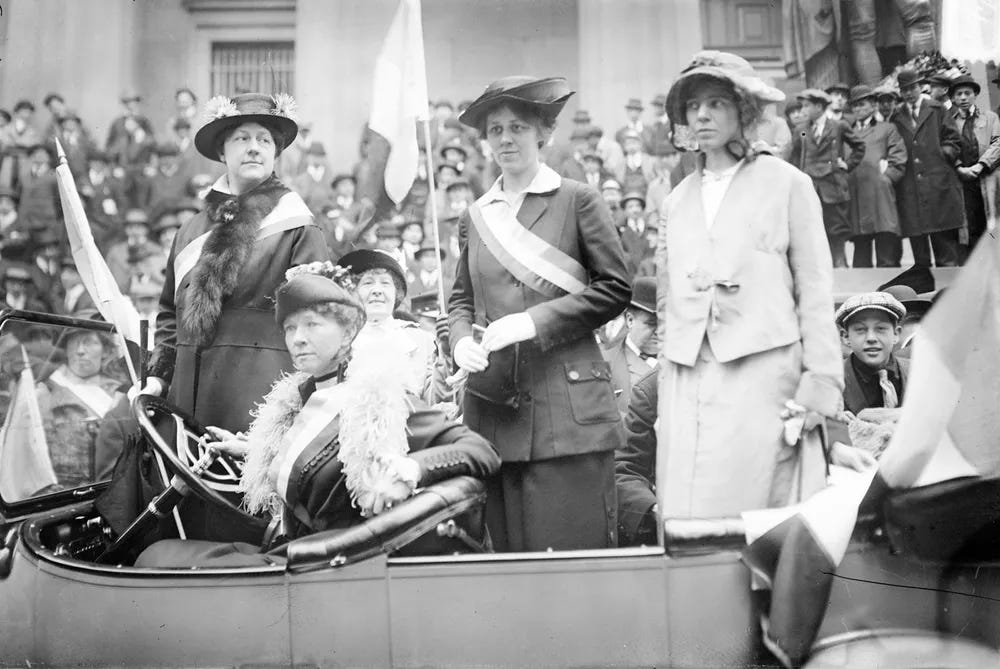
Productivity and the New Woman:
It’s finally time to talk about Pauline and her constant need to be busy. At the start of the novel, we’re given a breakdown of her morning schedule.
"7.30 Mental uplift. 7.45 Breakfast. 8. Psycho-analysis. 8.15 See cook. 8.30 Silent Meditation. 8.45 Facial massage. 9. Man with Persian miniatures. 9.15 Correspondence. 9.30 Manicure. 9.45 Eurythmic exercises. 10. Hair waved. 10.15 Sit for bust. 10.30 Receive Mothers' Day deputation. I1. Dancing lesson. 11. 30 Birth Control committee at Mrs.-"
And her secretary, Maisie, becomes flustered when Nona arrives hours early, eager to speak with her mother. It’s clear from the start that Pauline runs her family like a business to the point that her children refer to their mother’s bedroom as her “office.”
Pauline embodies the “New Woman” of the 1920s. The term refers to “women who challenged men’s social power by legitimating women’s work and exploring their role outside the home through both paid labor and political involvement” (Durkin, 2013). Pauline funds her own fire company, manages her homes like a general manages their troops, and of course, dedicates many hours of her day to support (often conflicting) charitable organizations.
Pauline comes from new money. Her father was a wealthy Midwestern car manufacturer. Her first husband, Arthur, grants her access to old New York (much like Ralph does for Undine in The Custom of the Country). The marriage dissolves when Pauline discovers Arthur’s infidelities. An old-money wife might have overlooked the indiscretion, but not Pauline. She then marries Dexter Manford, a self-made divorce attorney born on a Minnesota farm. They should be better suited for each other, but their need to “prove their social value through visibly productive work” gradually pulls the couple apart (Durkin, 2013). However, this constant drive to be productive has become so ingrained in American culture that neither of them will ever slow down (and neither does society).
Wharton is examining the influence of Taylorism on American culture. A Taylorized society is one where “all facets of family life are reducible to a mechanical scale: human bodies function as machines, family homes as factories, and relationships as business arrangements” (Durkin 2013). While Dexter works diligently at the office, Pauline works just as hard at home. The goal is to create a smoothly running, happy life, but what it actually results in is the breakdown of the family unit. Pauline aims to homogenize people to make them more manageable, but people are not like machines on a factory floor. While she might have the best intentions for her family, she fails to see how this approach causes more harm than good for the Manford-Wyant clan.
It’s interesting to compare this new, productive money class with the old money world of Arthur’s youth (and Wharton’s). Old New York families “seem secure in their elitism and embrace leisure to announce their affluence” (Durkin 2013). Meanwhile, the nouveau riche, like Pauline and Dexter, are unable to enjoy true leisure and even look down on it. Pauline remarks early on in the novel:
“An hour-why, there was no way of measuring the length of an empty hour! It stretched away into infinity like the endless road in a nightmare; it gaped before her like the slippery sides of an abyss. Nervously she began to wonder what she could do to fill it if there were not some new picture show or dressmakers' opening or hygienic exhibition that she might cram into it before the minute hand switched round to her next engagement.”
For Pauline, having any spare time is a nightmare, a sin to be avoided at all costs.
Like other “New Women,” Pauline also dismisses the “natural” beauty standards of the past for a more “produced form of womanhood” (Durkin 2013). She has a bathroom full of lotions and potions, a dedicated workout routine, and self-improvement exercises prescribed by her latest guru. When combined with her enthusiasm for conspicuous work, she becomes “strangely unnatural, even unwomanly,” a common critique of the New Woman (Durkin 2013).
Frankly, any time, past or present, when women challenge patriarchal norms, they are labeled as “unwomanly” and are often seen as less virtuous or even dangerous. Perhaps this is why Dexter finds the soft, feminine curves of Mrs. Toy and the carefree femininity of Lita so attractive. While he describes Pauline as “...[dominating] them all, grave and glittering as a goddess of Velocity. She enjoys it as much as other women do love-making.” While he may admire her efficiency and ability to manage their homes, he no longer seems to find her attractive. Her productivity has made her less feminine, at least in the eyes of her husband.
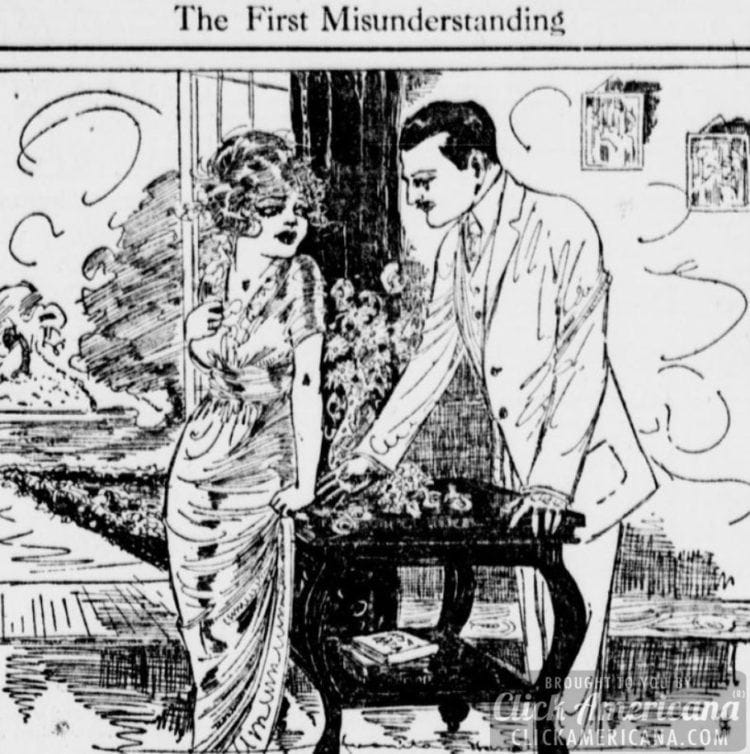
Divorce, it’s always about divorce!:
Here we are talking about divorce, again!
I won't spend much time on this topic, as we seem to discuss it in some way with every Wharton novel (so far). I want to explore how Wharton utilizes these characters to illustrate the evolution of society’s views on divorce and marriage over time.
First, we have Arthur and Pauline. For Pauline, divorce seems like the right choice when she finds out her husband is having an affair. She has many of the same “modern” ideas about marriage and divorce as Undine Spragg. Why stay in an unhappy marriage when divorce is an option? Meanwhile, Arthur feels the shame of his divorce so strongly that he drinks. He also refuses to marry the woman he cheated on Pauline with and instead lives in pseudo-sin with her, which is somehow more acceptable to him.4 Arthur embodies the social mores of the late 1800s.
What’s interesting is seeing how Pauline’s views on divorce shift after her own experience. While she doesn’t openly condemn divorce as an option, she also tries to prevent Jim and Lita from suffering its effects. Pauline had to work her way back into “good” society after divorcing Arthur. Although getting a divorce might be easier now, there is still a stigma attached to being a divorcee (of course, having a lot of money can help soften that stigma, but I digress). We see this when Pauline meticulously and triumphantly prepares for dinner at the Rivingtons.
“It was the first time they had invited Pauline since her divorce from Wyant; Mrs. Rivington's was the only house left in which the waning traditions of old New York still obstinately held out, and divorce was regarded as a social disadvantage. But they had taken Manford's advice successfully in a difficult case, and were too punctilious not to reward him in the one way he would care about. The Rivingtons were the last step of the Manford ladder.”
What mother would want her children to struggle like she did? Of course, she and Dexter will do everything in their power to prevent Jim and Lita from divorcing. (There’s also the whole Hollywood star element. Neither of her in-laws seems pleased about her being in films.)
Next, let’s look at Jim and Lita. While Jim is very much his father’s son, he also understands how the modern world works. He understands that if Lita wants out of their marriage, there’s nothing he can do to stop her. Some of this is because Lita is an unstoppable force, but it’s also because divorces are easier than ever to get in 1920s New York.
Lita speaks about divorce very flippantly. It’s like she’s talking about changing her dress, not dissolving her family to chase the Hollywood dream. When Pauline tells her not to think of her as a mother-in-law but as a friend, Lita coolly responds: “Oh, I’m not afraid of mother-in-laws; they’re not as permanent as they used to be.” And when asked about her reasons for divorcing, she replies, “I’m not much good at reasons. I want a new deal, that’s all.” Lita is no longer interested in Jim. She’s bored with marriage, like she’s bored with the furnishings in her home. Marriage has become something one does that can be undone in a moment–it’s not a long, permanent state of being.
While the rest of the Manford-Wyant family argues and sulks over Jim and Lita’s potential divorce, Nona observes everyone from the sidelines. Wharton compares her to a WWI “trench-watcher.”5 She takes on the responsibility of caring for each family member’s well-being. She learns that marriage and divorce can destroy happiness. By the end of the novel, Nona wants nothing to do with marriage. Instead, she’d “rather go into a convent and have done with it... a convent where nobody believes anything.” From her view, marriage brings only heartbreak and possibly even attempted murder!

Lita: The Jazz Age Vixen:
There are three leading ladies in Twilight Sleep, and we’ve discussed a lot about Pauline and Nona. I would be remiss if I didn’t take a moment to talk about the vixen of the novel–Lita. Throughout the novel, Lita is described as “restless”; in fact, all the youth are restless. “Jazz-age society has become almost completely unglued: the city’s elite is an incoherent mish-mash of people who have little connection to and even less sympathy for each other,” but this is also a generation of shifting morals and lifestyles (Griffith 2006). This is no longer a society that follows rigid social rules, attends formal balls, and can’t go out unchaperoned. This is a world of nightclubs, Hollywood starlets, and sexual promiscuity. New York is a place where young, old, rich, poor, Black, and White can all mix and socialize. For some, this blending of races and social classes is seen as a danger to society. For others, it’s a sign of progress and a move toward modernity.
Lita is the living, breathing embodiment of this shifting society. She is dangerous because she goes against everything the past generations believed in. She’s a modern woman seeking freedom. But she’s not looking for it because she wants to be progressive. She’s not a feminist. She’s a bored housewife desperate to cling to the freedom of her youth. She may be captivated by the bright lights of Hollywood, but when her comfort is challenged, and she witnesses the consequences of pursuing freedom and individualism at all costs, Lita retreats into the safety of the conventional. While she doesn’t divorce Jim, I can’t help but wonder how long it will be before she starts to hear the siren call of freedom again.
I found a fascinating piece about Lita and the Harlem Renaissance that I think would make an interesting follow-up read to Twilight Sleep. In it, the author discusses the changing culture in Jazz Age New York and how Lita might be passing for white. It’s a compelling perspective on the novel. You should be able to access a read-only version through JSTOR. If not, your library may have access to JSTOR.
There’s so much more I could discuss, but this is already too long. Instead, I will leave you with some final questions to ponder.
How does Wharton use interiors to show the difference in generations and shifting values/morals in 1920s New York?
Do you think Dexter, Pauline, and Arthur are good parents despite all their individual flaws?
Wharton repeatedly mentions that the baby has red hair. When Arthur looks at the painting of Jim as a boy, his demeanor shifts, and he finally decides to do something about Lita. So, who do you think fathered the baby?
When Wharton was writing Twilight Sleep, she had been living almost exclusively in France for several years. Does her depiction of New York feel different than in previous novels? Is it more or less vibrant? Does she feel connected to or detached from New York?
How did you feel about the ending? Was the big, dramatic moment confusing? Did you feel satisfied with the ending?
Conclusions:
Remember how I didn’t think I’d have anything to say about Twilight Sleep? We’re all allowed to be wrong sometimes.
While Twilight Sleep critiques modern life for its emphasis on making money, consumption, productivity, spirituality, psychology, and drugs—basically anything to avoid facing the realities of life. She doesn’t advocate for a return to the old ways. She’s not nostalgic for a bygone era. She seems to mourn the world she once knew, but is also unsatisfied with the modern world blooming to life all around her. Like the rest of the world, Wharton was also healing from the trauma of WWI. But she finds the reckless abandon that followed the war to be too much, and she has a point. While it’s understandable that people would seek to numb themselves after losing so many young men in a senseless war, it’s never going to be a good solution to the trauma. I think Twilight Sleep understands this. Wharton is sympathetic in her judgment of modern life, but I’m left questioning whether Wharton ever truly felt content with society in any of its forms.
Hopefully, this discussion was worth the wait. I’m glad I took the time to re-read Twilight Sleep and explore it more deeply. I think I understand why opinions are so divided on this one. If you didn’t enjoy it on your first read and you’ve made it this far, please consider giving it another try. You still might not love it, but I believe you’ll find that you appreciate it more.
Our next read, The Reef, started on July 1. I hope you can join me. I will post my thoughts on books one and two soon, so be sure to subscribe so you don’t miss a post!
As always, I’m looking forward to our next discussion, and thank you so much for reading along with me.
Happy Reading!
Sources:
Beer, Janet, and Avril Horner. “Wharton the ‘Renovator’: ‘Twilight Sleep’ as Gothic Satire.” The Yearbook of English Studies, vol. 37, no. 1, 2007, pp. 177–92. JSTOR, http://www.jstor.org/stable/20479285.
Katelyn Durkin. “The (Re)Production Craze: Taylorism and Regress in Edith Wharton’s Twilight Sleep.” Edith Wharton Review, vol. 29, no. 2, 2013, pp. 51–74. JSTOR, http://www.jstor.org/stable/10.5325/editwharrevi.29.2.0051.
GRIFFITH, JEAN C. “‘LITA IS—JAZZ’: THE HARLEM RENAISSANCE, CABARET CULTURE, AND RACIAL AMALGAMATION IN EDITH WHARTON’S ‘TWILIGHT SLEEP.’” Studies in the Novel, vol. 38, no. 1, 2006, pp. 74–94. JSTOR, http://www.jstor.org/stable/29533736.
She runs away with someone else because she won’t be his mistress.
Cedarledge does sound lovely.
Beer and Horner suggest this scene is inspired by The Castle of Otranto by Horace Walpole. Wharton the ‘Renovator’: ‘Twilight Sleep’ as Gothic Satire has a lengthy discussion of the comparisons between the two.
I might be embellishing their arrangement a bit, but it is a strange dynamic.
I thought it was interesting that the scene where this comment is made is the only direct mention of WWI. The war is an unnamed specter haunting the text.



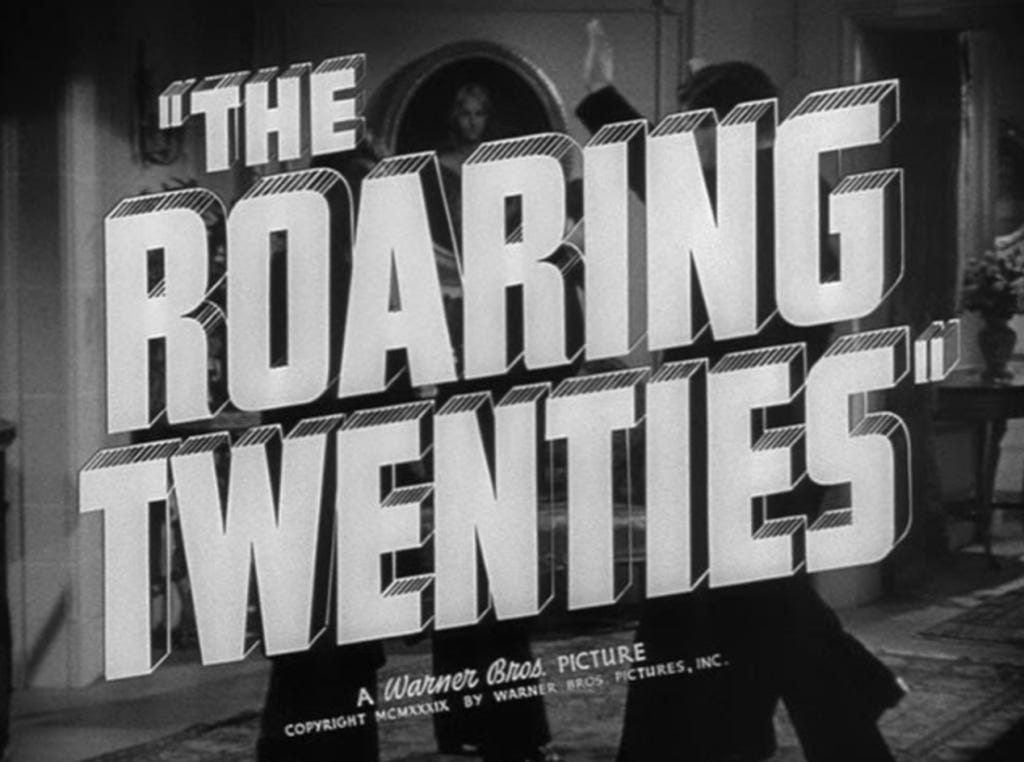
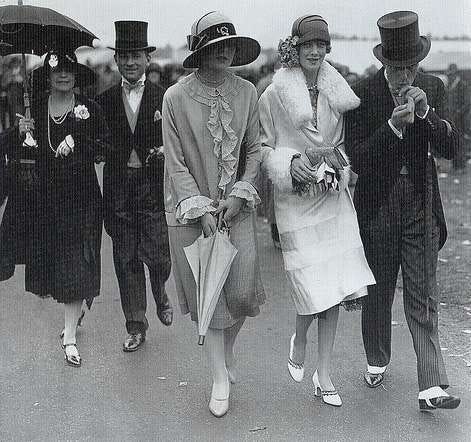

You ask, who do we think Jim's father is, because the assumption is that he is the son of Arthur Wyant. But there is that archly comic scene in Chapter XVIII where Pauline is telling Lita how much her husband, Dexter, cares for Lita's husband Jim. "You know he loves Jim as if he were his son--" To which Lita replies "in her cool silvery voice, with innocently widened eyes"--"Well--isn't he?" Which means that, at the same time as Pauline was getting a divorce from Arthur because of his affairs, she was having an affair of her own with Dexter, including bearing his son, Jim.
While reading "Twilight Sleep", I kept imagining Anya Taylor-Joy as Lita.
One aspect of “Twilight Sleep” that marks it as different from the other Wharton novels we have examined to date is the intrusion of new technology in the post-WWI period. Telephones were mentioned in “The House of Mirth” dating from 1905, but they were kept in the background and most communication was carried on by letter or telegram. By the time we get to “Twilight Sleep”, however, telephones have moved front and centre, and we see one on Dexter Manford’s law office desk early in the novel, which he uses in what seems to me to be a slightly self-conscious manner.
In the same scene, we are introduced to Miss Vollard, who works in an office adjoining Dexter’s. Today we would call her Dexter’s legal secretary, but he thinks of Miss Vollard as his “type-writer” because of the piece of office equipment she uses, perhaps a 1927 Underwood machine, like the one I used through high school and university, complete with original oil-cloth dust cover.
Most significantly, there is the increasing role of the automobile in everyday life in America during the 1920s. It is only because Dexter and Lita are able to drive and have reliable motor vehicles at their disposal that they have the means and opportunity to carry on their semi-affair behind the backs of everyone else in their extended family. They can both take off from Cedarledge in the morning and be gone for the day without anyone--except maybe Nona--being any the wiser as to where they might be and what they might be up to.